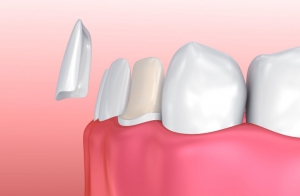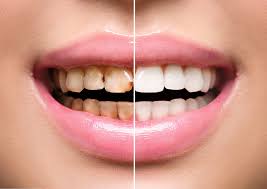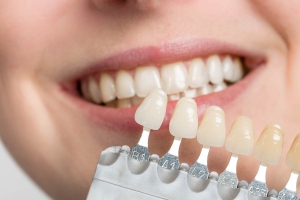What are Dental Veneers?
Dentists always look for new and better dental therapies to offer their patients. One such dental therapy that is gaining much popularity these days is veneers. What are veneers? Veneers are dentistry’s answer to tooth whitening – they are custom-made tooth enamel adhesives that can give your teeth a beautiful and natural-looking restoration. In the past, dentists used crowns to cover up teeth that were discolored or missing large sections. Today, veneers are popular because they provide the same level of cosmetic enhancement without the need for dental implants or crowns. Read on to learn more about veneers, their different types, how they’re put on teeth, and the various benefits and risks associated with them!
What are the different types of veneers?
 Dental veneers are thin pieces of porcelain placed on top of your teeth to improve their look and protect them from decay. Class I, II, and III are three types of dental veneers. Class I dental veneers are the most secure type and are used when you want the absolute best protection. Class II dental veneers can be used if you don’t like as much security or if you have minor tooth problems that won’t cause significant dentistry issues down the road. Finally, class III veneers provide a more natural appearance but do not offer as much protection from decay as class I or II dental veneers. Dental veneers are a one-time investment and can be restored if ever needed. If you’re interested in dental veneers, be sure to talk to your dentist about more about the different types and benefits of veneers.
Dental veneers are thin pieces of porcelain placed on top of your teeth to improve their look and protect them from decay. Class I, II, and III are three types of dental veneers. Class I dental veneers are the most secure type and are used when you want the absolute best protection. Class II dental veneers can be used if you don’t like as much security or if you have minor tooth problems that won’t cause significant dentistry issues down the road. Finally, class III veneers provide a more natural appearance but do not offer as much protection from decay as class I or II dental veneers. Dental veneers are a one-time investment and can be restored if ever needed. If you’re interested in dental veneers, be sure to talk to your dentist about more about the different types and benefits of veneers.
Porcelain veneers
Porcelain veneers are a popular way to improve your smile. They are custom-made to fit your teeth perfectly and last up to 10 years. However, you will need a consultation with a dentist before you can have them done, and you may need some antibiotics afterward.
Composite resin veneers
Composite resin veneers are the perfect replacement for traditional tooth enamel. They come in various colors and shapes, can be transparent, and usually last longer than natural teeth. In addition, composite resin veneers require no maintenance to enjoy your new look without hassle or fuss.
No-prep veneers
Dental veneers are a cosmetic dental treatment that uses a thin sheet of porcelain to correct teeth problems. No-prep veneers are the most common and the simplest to apply, requiring no preparation before surgery. The prep veneer requires some preparation – usually by laser – but is more durable than the no-prep version. Full-prep veneers require more practice, involving inserting a shaped denture into the gingiva (gums) and then applying the veneer onto it.
Veneers: Before and After
Dental veneers may be the solution for you if you’re unhappy with the look of your teeth. They’re custom-made based on your teeth’s shape and size, so you can be confident that they’ll look great after installation. Dental veneers can last anywhere from 6 months to 5 years, depending on how well you care for them. If you’re considering dental veneers, you must talk with a dentist about what would be best for your situation. Dental veneers can be a great way to improve the look of your teeth without having to go through the dental surgery process. So, what are you waiting for? Schedule an appointment today and see the dental veneer transformation for yourself!
How much do veneers cost?
Dental veneers may be the perfect solution if you’re unhappy with your teeth. Dental veneers are made from a material bonded to your tooth’s surface. This makes your tooth look natural and like it’s part of your teeth again. Veneers can be in the form of porcelain, all-metal, or composite – each type has its own benefits and drawbacks. Porcelain veneers are the most common and are the least expensive. They’re also the strongest and the most durable. All-metal veneers are the next most popular, and they’re strong but less durable than porcelain veneers. Composite veneers are the most recent innovation and are the strongest and most durable of the three types of veneers. They also have the added benefit of being able to restore teeth that have been damaged. Cost can vary depending on the type of veneer you choose, but in general, dental v
What are the benefits of dental veneers?
 There’s no doubt that dental veneers can improve the appearance of your teeth. They’re custom-made, so they fit each individual’s teeth perfectly. This means they can be placed on any dental surface – front, back, top or bottom – and look natural. Additionally, dental veneers can be used to repair teeth that have been damaged or missing due to decay or decay-related issues. Dental veneers’ many benefits include improved tooth aesthetics and increased confidence in social settings. Dental veneers are the perfect option for you if you want to enhance the look of your teeth without going through the hassle of dental surgery.
There’s no doubt that dental veneers can improve the appearance of your teeth. They’re custom-made, so they fit each individual’s teeth perfectly. This means they can be placed on any dental surface – front, back, top or bottom – and look natural. Additionally, dental veneers can be used to repair teeth that have been damaged or missing due to decay or decay-related issues. Dental veneers’ many benefits include improved tooth aesthetics and increased confidence in social settings. Dental veneers are the perfect option for you if you want to enhance the look of your teeth without going through the hassle of dental surgery.
How to prepare for your appointment
Dental veneers are a popular treatment option that can improve the appearance of teeth by changing their color or shape. Different types of veneers can be used for various purposes, such as changing the color of your teeth or improving their appearance. To have veneers custom-made for you, you’ll need to schedule an appointment with your dentist. Make sure to arrive at the dentist’s office on time and follow all instructions, as the procedure can be pretty complex. Once the veneers are in place, keep them clean and healthy by following the dentist’s instructions for care. Dental veneers are a great way to improve the appearance of your teeth and are a popular treatment option among dentists. If you’re considering dental veneers for your teeth, contact your dentist to get more information and schedule a consultation.
How are veneers put on teeth?
Dental veneers are a type of restoration that attaches a thin sheet of dental material to teeth that have suffered damage or decay. They can be used to correct cosmetic problems like uneven tooth shapes and gaps and functional issues like difficulty chewing or speaking clearly. When done correctly, dental veneers are an excellent long-term solution for restoring oral health and confidence. They can be a great option for people who are unhappy with the cosmetic appearance of their teeth or who have difficulty chewing or speaking clearly due to dental problems. If you’re interested in dental veneers, talk to your dentist about the best option.
What is the difference between veneers, crowns, and implants?
 There are three main dental restoration options – veneers, crowns, and implants. They offer advantages and disadvantages over the other two, so choosing the one that best suits your needs is essential. Here are a few things to remember when selecting dental restoration: Veneers are the most popular option and are thin layers of porcelain covering the teeth. They offer a natural look and feel and are relatively easy to install. – Crowns are similar to veneers, but they’re made of metal and have a more elaborate design. They offer a more natural look and feel but can be expensive and difficult to install. – Implants are the most complex dental restoration options and consist of several parts – the crown, bridge, abutment (or posts), and liner (a material that bonds the implant with your surrounding jawbone). They offer the best looks and feel but can be the
There are three main dental restoration options – veneers, crowns, and implants. They offer advantages and disadvantages over the other two, so choosing the one that best suits your needs is essential. Here are a few things to remember when selecting dental restoration: Veneers are the most popular option and are thin layers of porcelain covering the teeth. They offer a natural look and feel and are relatively easy to install. – Crowns are similar to veneers, but they’re made of metal and have a more elaborate design. They offer a more natural look and feel but can be expensive and difficult to install. – Implants are the most complex dental restoration options and consist of several parts – the crown, bridge, abutment (or posts), and liner (a material that bonds the implant with your surrounding jawbone). They offer the best looks and feel but can be the
How to take care of your veneers after they’re placed
Dental veneers are a treatment that can help improve the appearance of your teeth. However, after they are placed, it’s essential to take care of them to ensure they last and look their best. Here are some tips to help you take care of dental veneers: – Brush your teeth twice a day with fluoride toothpaste and a brush. – Visit your dentist regularly for check-ups. – If there are any problems with your veneers, don’t hesitate to let your doctor know.
Frequently Asked Questions
How long do veneers last on teeth?
Dental veneers are a type of dentistry that covers teeth without removing any natural tooth material. They are made of various materials like acrylic, porcelain, and metal and can last anywhere from two to six years. Veneers may need minor adjustments or repairs in the future if they experience wear or tear, but these should not cause any significant problems.
How much do veneers cost?
Dental veneers can cost anywhere from $1,500 to $6,000. The price depends on the type of dental veneer you choose and the complexity of your restoration project. Veneers are a great way to improve the appearance of teeth and restore their natural color.
What are the disadvantages of veneers?
Advantages of veneers include the following: – Veneers are a type of dental restoration that replace broken teeth with artificial ones. – They come in different colors, shapes, and sizes to suit the individual’s needs. – While veneers are usually very successful in restoring teeth to their original appearance, there are some downsides. – Major disadvantages include Damage to adjacent teeth during placement and removal, sensitivity to hot or cold foods, difficulty chewing hard foods, and tooth decay due to porcelain material used in veneers.
How long will it take to see the results of my treatment with dental veneers?
Generally, dental veneers will take about one hour to complete. During this time, your dentist will first determine your veneers’ size, shape, and color using X-rays. Once the design is finalized, the dental technician will apply a layer of decorative resin to your teeth. The next step is to apply a metal frame around each tooth which helps hold the artificial material in place. Lastly, your dentist will cure the veneer, and you’ll be able to enjoy your beautiful smile!
Conclusion
Dental veneers are a popular dental restoration option that can improve the look of your teeth. By understanding the different types of veneers and the preparation process, you can decide whether veneers are the correct restoration for you. If you have any questions or would like to schedule an appointment, please do not hesitate to contact us. We would be more than happy to help you out!


